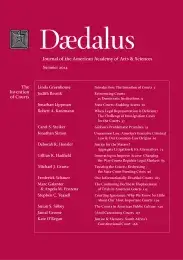Innovating to Improve Access: Changing the Way Courts Regulate Legal Markets
Struggling to navigate a world that is increasingly shaped by legal rules and obligations, most ordinary Americans lack real access to courts. Often this means simply forgoing legal rights and entitlements or giving up in the face of claims of wrongdoing. Among those who cannot avoid courts—such as those facing eviction, collection, or foreclosure and those seeking child support, custodial access, or protection from violence or harassment—the vast majority (as many as 99 percent in some cases) find themselves in court without any legal assistance at all. There are many reasons for this lack of meaningful access, including the underfunding of courts and legal aid, but perhaps the most fundamental is the excessively restrictive American approach to regulating legal markets. This regulation, controlled by the American legal profession and judiciary, closes off the potential for significant reductions in the cost of, and hence increases in access to, courts. Unlike the problem of funding, that is a problem that state courts have the power, if they can find the judicial will, to change.
The vast majority of ordinary Americans lack any real access to the legal system for resolving their claims and the claims made against them. Few outside the highest income categories can afford to take their disputes about family, inheritance, neighborhoods, schools, employment, and so on to court; they are left to resolve them as they can through other means. For significant numbers of Americans, not being able to afford legal help means simply “lumping” it, more so than in comparable countries.1 Millions of those who cannot avoid court– those who need a divorce or discharge in bankruptcy, for example, or who are facing eviction, foreclosure, garnishment, deportation, fines, or imprisonment– are left to navigate a complex and forbidding process without legal help. As Jonathan Lippman, Chief Judge of the State of New York, notes in his contribution to this issue, in 2010 in New York, for example, 98 percent of tenants facing eviction in housing court, 99 percent of borrowers in consumer credit matters within New York City, and 95 percent of parents in child support . . .
